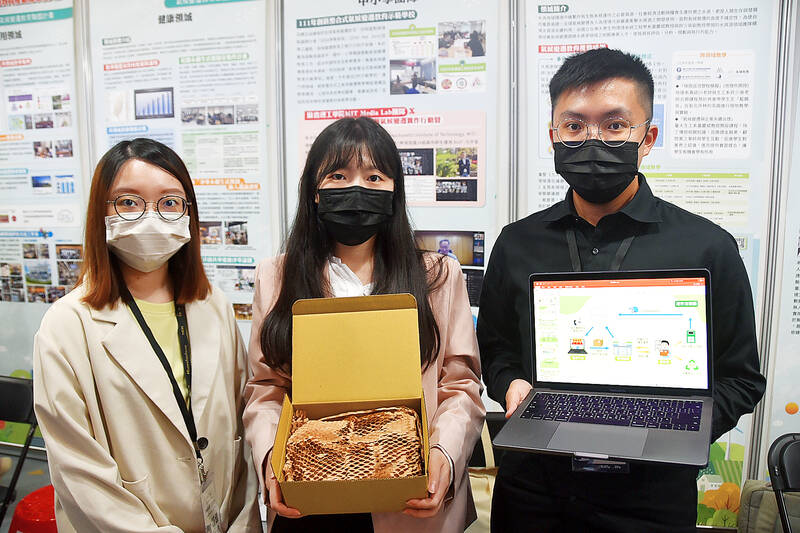Innovation would be key for Taiwan’s race to achieve net zero emissions by 2050, officials and business leaders said at the second edition of the Taiwan Climate Action Expo, which opened in Taipei yesterday.
The event’s organizers include the International Climate Development Institute (ICDI), the American Institute in Taiwan (AIT), the Biodiversity Research Center of National Taiwan University and Cathay Financial Holding Co.
The ICDI’s main functions are to train and educate people capable of assisting with the transition to carbon neutrality in a global context, and encourage Taiwan’s dialogue with the international community, ICDI director Chiou Chyi-rong (邱祈榮) said.

Photo: Wu Po-hsuan, Taipei Times
Additionally, the group facilitates collaborative projects by the government, academia and non-governmental organizations, Chiou said.
Climate change is the No. 1 risk to enterprises and Taiwan must not fall behind the rest of the world in enacting mechanisms to protect businesses, markets and finances from the impact of climate warming, Cathay Financial Holding president Lee Chang-ken (李長庚) said.
The UN’s COP26 climate summit last year made clear that climate change is a severe challenge with worrying ramifications for future generations, Environmental Protection Administration Deputy Minister Shen Chih-hsiu (沈志修) said.
The government next year plans to amend the climate change bill being deliberated by the legislature that would facilitate the country’s net zero transformation, Shen said.
The extreme climate change crisis must be met by strong governmental action, said Alan Lin (林子倫), deputy executive director of the Executive Yuan’s Office of Energy and Carbon Reduction.
Since 2016, Taiwan has added 12 gigawatts of renewable generation capacity to the country’s electricity grid and innovative concepts would be required for the net zero push, Lin said.
The administration of President Tsai Ing-wen (蔡英文) has shown that passing the climate change bill is an agenda of great importance that should be pushed through the legislative process, Deputy Legislative Speaker Tsai Chi-chang (蔡其昌) said in a pre-recorded message.
Climate change must not be allowed to reach the inflection point that leads to systematic collapse, said Hung Sun-han (洪申翰), chairman of the Legislative Yuan’s Sustainable Development Committee.
The nation has to mobilize assets from every domain to fight climate change, including making use of international collaboration, Hung said.
The expo showcases several concepts, including a proposed E-point system that was honored in the Ministry of Education’s Climate Change Education innovation competition this year.
Inspired by a German idea, E-point is a platform that enables people to trade in packaging material at convenience stores as part of a loyalty program, said project codesigner Wu Ming-yang (巫明洋), a student of business management at Fu Jen Catholic University.
The expo — which is to end tomorrow — features ICDI and AIT’s youth engagement program for climate issues and conferences on climate action for officials, entrepreneurs and academics.

The manufacture of the remaining 28 M1A2T Abrams tanks Taiwan purchased from the US has recently been completed, and they are expected to be delivered within the next one to two months, a source said yesterday. The Ministry of National Defense is arranging cargo ships to transport the tanks to Taiwan as soon as possible, said the source, who is familiar with the matter. The estimated arrival time ranges from late this month to early next month, the source said. The 28 Abrams tanks make up the third and final batch of a total of 108 tanks, valued at about NT$40.5 billion

A group from the Taiwanese Designers in Australia association yesterday represented Taiwan at the Midsumma Pride March in Melbourne. The march, held in the St. Kilda suburb, is the city’s largest LGBTQIA+ parade and the flagship event of the annual Midsumma Festival. It attracted more than 45,000 spectators who supported the 400 groups and 10,000 marchers that participated this year, the association said. Taiwanese Designers said they organized a team to march for Taiwan this year, joining politicians, government agencies, professionals and community organizations in showing support for LGBTQIA+ people and diverse communities. As the first country in Asia to legalize same-sex

Travel agencies in Taiwan are working to secure alternative flights for travelers bound for New Zealand for the Lunar New Year holiday, as Air New Zealand workers are set to strike next week. The airline said that it has confirmed that the planned industrial action by its international wide-body cabin crew would go ahead on Thursday and Friday next week. While the Auckland-based carrier pledged to take reasonable measures to mitigate the impact of the workers’ strike, an Air New Zealand flight arriving at Taipei from Auckland on Thursday and another flight departing from Taipei for Auckland on Saturday would have to

MOTIVES QUESTIONED The PLA considers Xi’s policies toward Taiwan to be driven by personal considerations rather than military assessment, the Epoch Times reports Chinese President Xi Jinping’s (習近平) latest purge of the Chinese People’s Liberation Army (PLA) leadership might have been prompted by the military’s opposition to plans of invading Taiwan, the Epoch Times said. The Chinese military opposes waging war against Taiwan by a large consensus, putting it at odds with Xi’s vision, the Falun Gong-affiliated daily said in a report on Thursday, citing anonymous sources with insight into the PLA’s inner workings. The opposition is not the opinion of a few generals, but a widely shared view among the PLA cadre, the Epoch Times cited them as saying. “Chinese forces know full well that